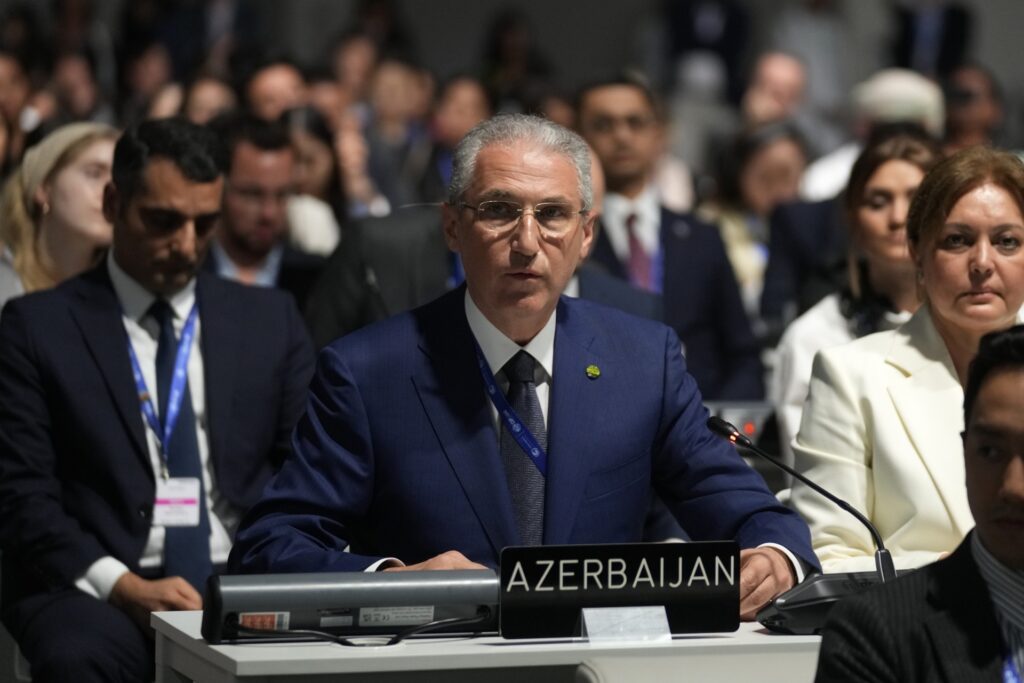As the U.S. and Israel seek to contain Iranian proxies along multiple fronts, major Jewish leaders are highlighting a little-known yet critically strategic relationship between the Jewish state and Azerbaijan, asserting that the predominantly secular, Shia-majority Muslim nation “ranks first” as a key ally of the West against the radical terrorist regime in Tehran, while noting its potential role in expanding the Trump-brokered Abraham Accords peace agreements to include Muslim nations beyond the Arab states.
In a set of exclusive interviews with Breitbart News, American Jewish leaders highlighted the “very strong” relationship between the Jewish state and Azerbaijan, pointing to almost three millennia of Azeri-Jewish relations dating back to the Babylonian exile. The relationship is marked by peaceful coexistence, particularly in Azerbaijan’s multi-ethnic, predominantly Muslim society.
Israel and Azerbaijan’s multifaceted partnership spans energy, military, and technology sectors, challenging traditional regional alignments and perceptions.
Malcolm Hoenlein, longtime leader of the Conference of Presidents of Major American Jewish Organizations — the coordinating body for 50 national Jewish organizations — which has been working with organizing visits to Azerbaijan for decades, noted that the relationship between the two countries and peoples is not a new one.
“There’s an ancient Jewish community there that has enjoyed the rare experience of no antisemitism during its 2,700 years,” he said. “And it’s really something unknown in much of the Jewish community and the world that you have these Muslim countries, like Kazakhstan and Uzbekistan and others, as well as Georgia, which is a Christian country, that together took in almost half a million Jews during World War II.”

Mukhtar Babayev, Azerbaijan ecology and natural resources minister, attends a plenary stocktaking session at the COP28 U.N. Climate Summit, Monday, Dec. 11, 2023, in Dubai. (AP Photo/Rafiq Maqbool, File)
Hoenlein recalled that during a briefing he was conducting for a delegation of Jewish leaders on one of their first visits to the predominantly Muslim country, he suggested that members remove their yarmulkes (Jewish skullcaps) out of “sensitivity” to the residents. However, the police chief present was taken aback by his warning, assuring him that “you can wear a yarmulke anywhere here and no one will even look at you askance.”
“And so it was,” he attested. “Not only could we walk with yarmulkes, but the synagogues displayed Israeli flags, and the people would greet us with ‘Shalom!’ wherever we went.”
“We also had kosher food there, and there was a Chabad [religious community and outreach movement] along with other Jewish life that was functioning,” he added.
In addition, he noted how when visiting Quba, a city situated in the northeastern part of the country known for its picturesque landscapes and historical significance, one can see the original neighborhood where the Jews lived across from Muslims and the two continue to “live in harmony now for more than 1,600 years.”
Describing a “vibrant community with Jewish schools,” Hoenlein called attention to the “full religious and cultural freedom” Jewish residents enjoy.
He also discussed his meetings with Azerbaijani President Ilham Aliyev, as well as his late father, former President Heydar Aliyev.
“I have to say that there are very few things that we’ve raised with them or that we’ve discussed with them where we didn’t get a positive outcome,” he said.
President Aliyev, he continued, “really values the relationship with the Jewish community there along with the global Jewish community, and, of course, Israel,” where the ties are “obviously very strong,” noting the presence of ambassadors in both countries and their increasing trade and strategic cooperation.
According to Hoenlein, the strategic geopolitical importance of Central Asia has been “very regrettably neglected” by both the United States and the West in general.
“They are western-oriented countries who face off against pressure from Russia, from China, and from Iran, and yet hold steadfast,” he said, maintaining that a future aim of the historic Abraham Accords will be “to expand to Muslim countries like those in Central Asia — facilitating for other countries to join as more Muslim states participate, not just Arab ones.”
Martin Oliner, chairman of the Religious Zionists of America and president of the Culture for Peace Institute who was appointed by then President Donald Trump as a member of the U.S. Holocaust Memorial Council, described Azerbaijan as a “beacon of religious freedom.”
“The last time I was there, we visited the Mountain Jews who have been in Azerbaijan for many hundreds of years, and they have had total religious freedom and total religious rights,” he said.
Pointing to its location being partially situated along the border of Iran, “with whom it doesn’t have the greatest relations,” he called America’s practice of “neglecting” the Muslim-majority country a “foolish mistake”:
Azerbaijan has an Azeri population, and next door in Iran there is a very large Azeri population as well. So you have those elements and it’s unfortunate that so much emphasis has been placed on some of its neighbors and no one considers Azerbaijan [itself] significantly, though they should. If anything in the future is to be done with Iran by the West, it will certainly involve the Azeris who are in Iran, but more importantly, Azerbaijan itself.
“It’s not just the Israel relationship,” he added, “it’s more the relationship that America could have with Azerbaijan that it’s just not taking advantage of.”
Oliner referred to “errors” in U.S. policy in the Middle East, including its relatively weak stance on toppling Hamas, and it’s over-the top treatment for Qatar in contrast to its disregard of Bahrain, Dubai and the UAE, as he highlighted America’s tendency to “neglect” the latter countries, reflecting a lack of meaningful “appreciation” for her friends and allies.

Azerbaijan’s Foreign Minister Elmar Mammadyarov, left, visits the Hall of Names at the Yad Vashem Holocaust memorial in Jerusalem, Monday, April 22, 2013. (AP Photo/Bernat Armangue)
“That’s where we’re at and it’s unfortunate,” he said, calling for a “broad diplomatic agreement on all outstanding differences between [opposing nations] Armenia and Azerbaijan.”
“I know that both sides are trying to do that, but short of that you have to remember that when it comes to Iran, when it comes to a significant ally of America and Israel, Azerbaijan ranks first,” he added.
He also described the recent opening of an embassy in Tel Aviv of Azerbaijan — a secular Shi’ite Muslim nation — as a “criticality important” event.
“There have been good relationships between Azerbaijan and Israel for the longest time, and now they’ve become public,” he said, “but the emphasis also has to do with the West and with Washington, and Washington really has to appreciate its allies — and it does not.”
“Here is a real example of where there’s a perfect country that America should be establishing the closest of relationships, but it’s not [doing so],” he added.
Zionist Organization of America (ZOA) head Morton Klein, who has headed the nation’s oldest pro-Israel organization for two decades, pointed to the opening of Azerbaijan’s embassy in Israel last year, after having enjoyed diplomatic relations for years.
“It is of critical security value to have a Muslim country like Azerbaijan friendly toward Israel, especially when it sits on a long border with Iran,” he said, expressing his hope to visit the country’s leaders in the near future.
Voicing his belief that the U.S.-Israel relationship is a critical one for both countries, Stanley Stern, the president of NORPAC New York, told Breitbart News that Azerbaijan, being a friend of Israel, has many strategic values.
“They provide oil for Israel, and purchase a lot of weapons from Israel, and they have not openly criticized the Jewish state since October 7 — having, instead, held firm with Israel,” he said, noting that all these things are important.
“It’s a friendly, strategic, moderate country that seems to have very mutually beneficial relations with Israel — which could use many such moderate Muslim friends,” he added.
Noting that Azerbaijan is in close proximity to both Iran and Russia, and is “moderate, openly supportive, and our friend’s friend,” Stern concluded by stating he personally believes it is only logical to encourage strong relationships with the secular Muslim country.
Joshua Klein is a reporter for Breitbart News. Email him at jklein@breitbart.com. Follow him on Twitter @JoshuaKlein.

COMMENTS
Please let us know if you're having issues with commenting.